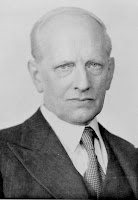Beiser finds in this German tradition some intriguing anticipations of more recent Anglophone, analytic philosophers' themes. E.g., his chapters on Windelband, Rickert, and Emil Lask are relevant to some recent debates about normativity. (Beiser argued for the relevance of these neo-Kantians in an earlier article [2009].) I find especially interesting Beiser's characterization of one of Rickert's failures:
The chief problem with [Rickert's] theory ... is that it cannot account for how actual thinking conforms to norms, or for how we act according to norms in the concrete historical world. Rickert has to be given credit for seeing this problem; yet he argues that it is impossible to solve it. He not only admits but insists that reason does not have the power to explain the connection between the normative and the natural. He declares it an irresolvable, eternal mystery that actual thinking could conform to norms, and that moral purposes could be realized in the empirical world. (Beiser, p. 441)Shades here of some of the problems that have beset recent philosophies of mind, such as Donald Davidson's anomalous monism, a similarity that seems closer when Beiser says (p. 407) that Rickert took natural laws to be applicable to each particular event but not to each property of each event. Unlike Davidson, Rickert's doubts about the completeness of natural laws with respect to all properties seem to have stemmed from doubts about the applicability of natural laws to qualitative properties. According to Beiser, Rickert took natural laws to capture only the quantitative features and to omit all "the intrinsic qualitative properties of a thing." (Beiser, p., 407)
In the chapter on Max Weber, Beiser spots another case of Anglophone philosophers re-inventing a wheel. He says:
The position Weber arrived at by 1914 was indeed well ahead of its time. Collingwood ... arrived at a position close to Weber's only in the 1940's; but then it had all the weaknesses of the early formulations of the doctrine of Verstehen that Weber had already seen and eliminated by the early 1900's. The rational core of Collingwood's theory was rescued in the 1960's and 1970's by Anglophone philosophers ... by using normative concepts akin to those Weber had already proposed in 1914. (Beiser, p. 514)

